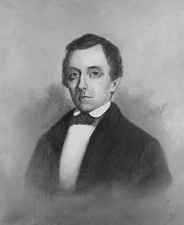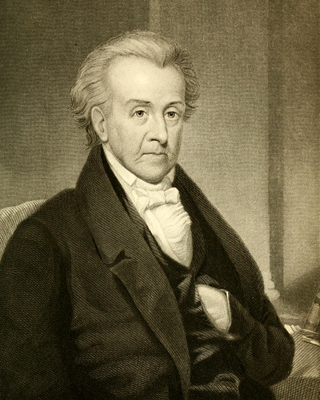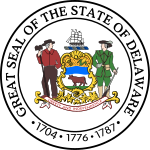Joseph Haslet was an American planter and politician from Cedar Creek Village in Cedar Creek Hundred, Sussex County, Delaware. He was a member of the Democratic-Republican Party, who served twice as Governor of Delaware.

The 1822–23 United States Senate elections were held on various dates in various states. As these U.S. Senate elections were prior to the ratification of the Seventeenth Amendment in 1913, senators were chosen by state legislatures. Senators were elected over a wide range of time throughout 1822 and 1823, and a seat may have been filled months late or remained vacant due to legislative deadlock. In these elections, terms were up for the senators in Class 2.

The 1804 Delaware gubernatorial election was held on October 2, 1804.

The 1807 Delaware gubernatorial election was held on October 6, 1807.

The 1810 Delaware gubernatorial election was held on October 2, 1810.

The 1813 Delaware gubernatorial election was held on October 5, 1813.

The 1816 Delaware gubernatorial election was held on October 1, 1816. Incumbent Federalist Governor Daniel Rodney was unable to seek re-election due to term limits. Former State Representative John Clark ran as the Federalist nominee, and narrowly defeated Democratic-Republican nominee Manaen Bull to hold the office for his party.

The 1819 Delaware gubernatorial election was held on October 5, 1819. Incumbent Federalist Governor John Clark was unable to seek re-election due to term limits. State Senator Henry Molleston ran as Clark's successor, winning the Federalist nomination. He faced Manaen Bull, Clark's 1816 opponent, and the Democratic-Republican nominee. Molleston won by a fairly wide margin, but died on November 11, 1819, prior to assuming office. State Senate President Jacob Stout became Governor and a special election was held in 1820.

The 1820 Delaware gubernatorial special election was held on October 3, 1820. The winner of the 1819 gubernatorial election, Henry Molleston, died before assuming office, elevating State Senate Speaker Jacob Stout to the governorship and triggering an election in 1820. However, the election was not just for the remainder of Molleston's term, but instead for a full three-year term.

The 1823 Delaware gubernatorial special election was held on October 7, 1823. A few months into his three-year term, Democratic-Republican Governor Joseph Haslet died in office, elevating State Senate Speaker Charles Thomas to the governorship and triggering a special election in 1823. Justice of the Peace David Hazzard ran as the Democratic-Republican nominee to succeed Thomas and faced State Senator Samuel Paynter, the Federalist nominee. Paynter narrowly defeated Hazzard, regaining the office for the Federalists.

The 1826 Delaware gubernatorial election was held on October 3, 1826. Incumbent Federalist Governor Samuel Paynter was barred from seeking re-election to a second consecutive term. State Senator Charles Polk Jr. ran as the Federalist nominee to succeed Paynter, while 1823 Democratic-Republican nominee David Hazzard once again ran as his party's nominee. Polk ended up defeating Hazzard by a narrow margin, barely holding onto the governorship for the Federalists.

The 1844 Delaware gubernatorial election was held on November 5, 1844. Whig Governor William B. Cooper was unable to seek re-election to a second term. Thomas Stockton, the former New Castle County Register in Chancery, ran as the Whig nominee to succeed Cooper. He faced former State Senator William Tharp, the Democratic nominee. Despite the state's strong financial condition, Whigs came close to losing their grip on power; Stockton only defeated Tharp by 45 votes, or 0.37%. However, Stockton died a year into his term, on March 2, 1846, elevating the Speaker of the State Senate, Joseph Maull, to the governorship, and triggering a special election in 1846. Maull, served just two months before he, too died, elevating State House Speaker William Temple to the governorship.

The 1846 Delaware gubernatorial special election was held on November 3, 1846. A year into the term of Whig Governor Thomas Stockton, elected in 1844, he died, elevating State Senate Speaker Joseph Maull to the governorship. Maull, in turn, also died, making State House Speaker William Temple Governor. Former State Representative Peter F. Causey ran as the Whig nominee to succeed Temple, and faced former State Senator William Tharp, the Democratic nominee from 1844. Tharp narrowly defeated Causey, returning the Governorship to the Democratic Party.

The 1820 New Hampshire gubernatorial election was held on March 14, 1820.

The 1821 New Hampshire gubernatorial election was held on March 13, 1821.

The 1822 New Hampshire gubernatorial election was held on March 12, 1822.

The 1813 Connecticut gubernatorial election took place on April 12, 1813.

The 1815 Connecticut gubernatorial election took place on April 10, 1815.

The 1809 Connecticut gubernatorial election took place on April 10, 1809.

The 1814 Connecticut gubernatorial election took place on April 11, 1814.









